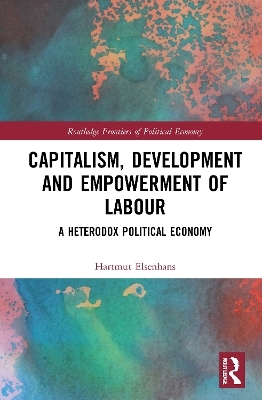
Capitalism, Development and Empowerment of Labour
Routledge (Verlag)
978-1-032-02240-6 (ISBN)
The dominant neoliberal approach presents politics and political economy as nuisances which disturb the smooth operation of self-regulating markets. But political economy is not merely an academic issue – it is a class issue, and this book forcefully argues that political economy should return to a central position in the study of the social sciences.
Offering nothing less than a reconciliation of Marxian, Keynesian and neoclassical economics, the work opens with a discussion of the key, interconnected economic concepts which help us to understand capitalism: price, income, profit, value, growth and crisis. Prices reflect income distribution and therefore class relations, and the chapters show that the very emergence of capitalism resulted from mass empowerment of the so-called "lower orders". Profit is always available if entrepreneurs spend on net investment and create incomes for additional labour; this, in turn, requires expanding demand, and so therefore profit depends on rising mass incomes. Conversely, underdevelopment is the result of the destitution and disempowerment of the masses. In the Global South today, it is clear that enormous riches go hand in hand with widespread misery and poverty because the market does not transform wealth into the kind of investment that might benefit all. This book argues that the new wealth triggered by productivity increases has enabled the rich to liberate themselves from the capitalist constraints of competition and waste their new wealth in the form of rents. The main threat today is, in fact, the globalisation of rent. The text makes a point for a progressive counter strategy: capitalist structures that empower labour need to be transferred to the Global South. This requires political and economic efforts towards empowering labour in the Global South.
This book demonstrates the analytical power of political economy for all social scientists and will be invaluable reading for economists, political scientists and sociologists in particular.
Hartmut Elsenhans is Professor Emeritus at the Global and European Studies Institute, Leipzig, Germany.
Introduction 1. The determination of prices: The relevance of value theory against the centrality of the egalitarian foundation of flexibility and efficiency in capitalism 2. The macroeconomics of profit, crisis and growth in capitalism 3. Rising mass incomes as a safeguard for capitalism 4. Rent blocks capitalism: Today’s underdeveloped world 5. On the intelligent use of rent for overcoming underdevelopment 6. The globalisation of an underconsumptionist threat and the emergence of a doomsday scenario of globalisation 7. The globalisation of rent 8. The alternative: Defending mass interests and capitalism through rising mass demand: some concluding considerations
| Erscheinungsdatum | 05.10.2021 |
|---|---|
| Reihe/Serie | Routledge Frontiers of Political Economy |
| Zusatzinfo | 10 Tables, black and white; 6 Line drawings, black and white; 6 Illustrations, black and white |
| Verlagsort | London |
| Sprache | englisch |
| Maße | 156 x 234 mm |
| Gewicht | 344 g |
| Themenwelt | Sozialwissenschaften ► Politik / Verwaltung |
| Wirtschaft ► Allgemeines / Lexika | |
| Wirtschaft ► Volkswirtschaftslehre ► Makroökonomie | |
| Wirtschaft ► Volkswirtschaftslehre ► Wirtschaftspolitik | |
| ISBN-10 | 1-032-02240-X / 103202240X |
| ISBN-13 | 978-1-032-02240-6 / 9781032022406 |
| Zustand | Neuware |
| Informationen gemäß Produktsicherheitsverordnung (GPSR) | |
| Haben Sie eine Frage zum Produkt? |
aus dem Bereich


